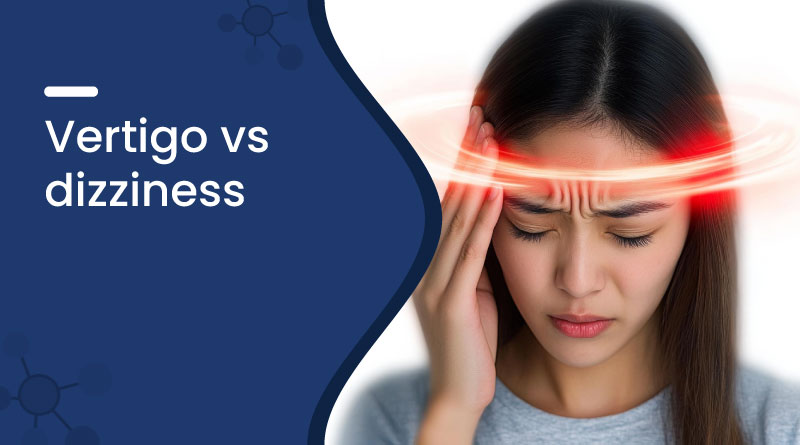Vertigo vs Dizziness | Differences, Causes & Symptoms


Vertigo is a spinning sensation, as if you or your surroundings are moving. Dizziness is a more general feeling of lightheadedness, unsteadiness, or faintness without the spinning sensation. While vertigo feels like a "rotational illusion," dizziness is often described as feeling unbalanced or floating. The causes also differ: dizziness may result from low blood pressure, dehydration, or medication side effects. Recognizing the difference is crucial for proper diagnosis and effective treatment.
How to Identify Which One You Have
To determine whether you’re experiencing vertigo or general dizziness, pay attention to how the sensation feels:
Vertigo typically involves spinning, tilting, or swaying sensations, often triggered by head movements. Nausea, vomiting, and balance issues may occur.
Dizziness feels more like faintness, instability, or lightheadedness, without the perception of spinning.
Vertigo often points to a vestibular disorder, while dizziness may have cardiovascular, neurological, or metabolic causes. Understanding which one you have helps direct proper diagnosis and treatment.
Main Difference Between Vertigo & Dizziness:
| Symptoms | Vertigo | Dizziness |
|---|---|---|
| Main sensation | Spinning, tilting, swaying feeling | Lightheaded, unsteady, faint sensation |
| Onset triggers | Head movement or sudden position | Standing, dehydration, stress-related |
| Nausea | Common, often severe occurrence | May occur, usually mild |
| Balance issues | Difficult to walk straight | Mild to moderate unsteadiness |
| Cause | Inner ear or nerve problems | Blood pressure, dehydration, medications |
| Duration | Seconds to days, sometimes longer | Seconds to minutes may recur |
| Associated symptoms | Hearing loss, tinnitus, ear fullness | Sweating, blurred vision, weakness |
| Impact on daily life | Strong, inability to walk or drive | Moderate caution during movement |
| Treatment | Therapy, and nausea medicine | Hydration, rest, and treat cause |
| Medical urgency | Possible stroke or serious illness | Heart or blood pressure problems |
| Specialist to see | ENT, neurologist consultations recommended | Primary care, cardiologist, neurologist |
When to See a Doctor
- Persistent or severe vertigo or dizziness lasting more than a few hours
- Sudden, severe headache, unlike previous headaches
- Double vision, slurred speech, or difficulty walking
- Weakness or numbness in the face or limbs
- Hearing loss or ringing in the ears with vertigo
- Chest pain, palpitations, or shortness of breath
- Fainting or repeated near-fainting spells
- Vertigo following a head injury
General Methods for Treating Vertigo vs. Dizziness
| Method | Explanation |
|---|---|
| Hydration | Drink enough water to prevent dizziness caused by dehydration. |
| Position changes | Stand up slowly to avoid feeling dizzy. |
| Balance retraining therapy | Balance exercises help retrain the brain for stability control. |
| Relocation moves | Special head movements reposition inner ear crystals, causing vertigo. |
| Balanced diet | Healthy meals prevent dizziness from low sugar or nutrient deficiencies. |
| Limit caffeine/alcohol | Avoid excess to reduce vestibular irritation and dehydration risks. |
| Stress management | Relaxation techniques reduce anxiety and dizziness-related episodes. |
Keep Your Balance System Healthy
- Keep your inner ear healthy with simple lifestyle changes:
- Stay hydrated and maintain a balanced diet with enough iron and vitamins.
- Avoid sudden head movements or getting up too quickly.
- Manage stress through meditation, yoga, or breathing exercises.
- Limit alcohol, caffeine, and smoking, which can worsen balance problems.
- Exercise regularly to keep your cardiovascular and nervous systems strong.
- Get ear infections treated quickly to avoid balance problems.
Can Vertigo and Dizziness Be Completely Cured?
It depends on the cause. Some vertigo can be fully resolved with repositioning methods. Others, like Meniere’s disease, can be managed but may recur. Dizziness from dehydration or low blood sugar usually resolves once the cause is treated. However, both symptoms can return if underlying triggers aren’t addressed. Consistent lifestyle care and medical follow-up reduce recurrence and improve quality of life.
Final Thoughts
Although vertigo and dizziness can feel similar, they are distinct sensations with different underlying causes. Vertigo involves a spinning or tilting sensation linked to inner ear or brain problems, while dizziness refers to lightheadedness or instability from various causes. Correctly identifying which one you have is key to proper treatment—vestibular therapy and maneuvers for vertigo, hydration, and addressing cardiovascular or metabolic factors for dizziness. By knowing the difference, you can seek the right care, reduce discomfort, and prevent future episodes.
Frequently Asked Questions (FAQs)
Q: Is vertigo the same as dizziness?
A: No, vertigo is a spinning feeling, and dizziness is a lightheaded feeling.
Q: Which is more serious—vertigo or dizziness?
A: Both can signal serious conditions, but vertigo often points to vestibular or neurological problems, while dizziness may relate to heart or blood pressure issues.
Q: Is it possible to experience vertigo and dizziness together?
A: Yes. For example, vertigo can cause dizziness due to loss of balance and nausea.
Q: What causes vertigo most often?
A: Inner ear problems, infections, vestibular disorders, head injury, and medication side effects can result in vertigo.
Q: What causes dizziness most often?
A: Dehydration, low blood pressure, anemia, anxiety, or medication side effects.
Q: How do treatments differ between vertigo and dizziness?
A: Vertigo often needs vestibular therapy or specific maneuvers; dizziness treatment depends on its cause—hydration, diet changes, or medication.
Recent Blogs
Disclaimer : Zeelab Pharmacy provides health information for knowledge only. Do not self-medicate. Always consult a qualified doctor before starting, stopping, or changing any medicine or treatment.
Related Products
Need Medicines Quick?
Share location to check quick delivery serviceability.
Change Location
Location Access Needed
Your location appears to be blocked or disabled.
Please enable the location from your browser or
device settings.

₹ 0
0
Items added
Quick Links
Categories
Our Policies
2026 Copyright By © Zeelab Pharmacy Private Limited. All Rights Reserved
Our Payment Partners

 Added!
Added!
|
|













